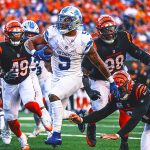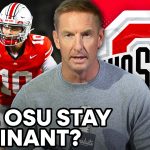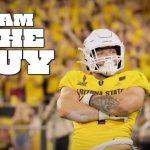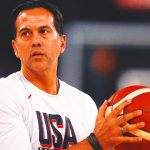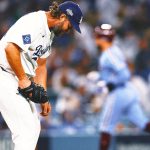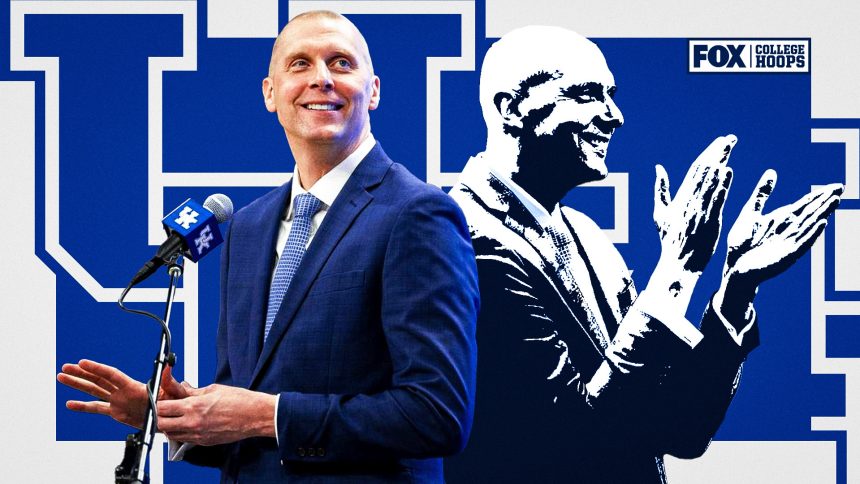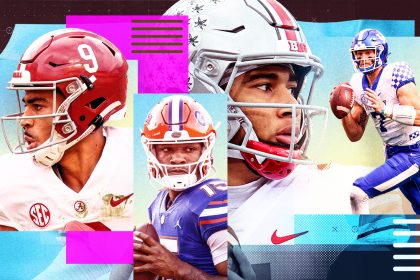Mark Pope sat down in his office on a Zoom call, smiling from ear to ear with a look of excitement on his face – one that says he’s enjoying every second of life.
As hectic as it might be to take over a college basketball program and build it from the ground up, especially a blue-blood program like Kentucky, it’s a special time for Pope, who is now home in Lexington.
A senior captain on Rick Pitino’s legendary 1995-96 “Untouchables” team, Pope transferred to Kentucky from Washington for the final two years of his collegiate career and was a part of history before being selected in the second round of the 1996 NBA Draft by the Indiana Pacers.
For Pope, who played nine years professionally and has spent the last 14 years coaching, with previous stops at Utah Valley and BYU, the idea of taking over for John Calipari following a season where the Hall of Famer had the nation’s No. 1 recruiting class seemed unfathomable.
ADVERTISEMENT
“I would have said you’re crazy for a hundred different reasons,” Pope told FOX Sports when asked what he would have said a year ago if he was told he’d be the next head coach at Kentucky. “No. 1: Cal was on track to coach here forever. He did such unbelievable work here. In his own way, he set a new trajectory for college basketball, which is what so many coaches here at Kentucky have done. They’ve revolutionized the game in their own way. No. 2: Because I was in an unbelievable situation at BYU. We’re super proud of the work we did there. It’s an incredible place to coach and to be affiliated with. And No. 3: Often times, your wildest dreams don’t come true, but in this case, they did.”
That wild dream has allowed Pope to hit the ground running, fielding a team from scratch and finding 12 new players as the Wildcats begin practice this week. While Kentucky has not reached the second weekend of the NCAA Tournament since 2019, Calipari’s energy and accomplishments early in his tenure still make these big shoes to fill. And there won’t be a date in college basketball more anticipated than when the Arkansas head coach returns to Rupp Arena this upcoming season.
“We’re in the same league and we get to go head-to-head here at Rupp this year. And it’s going to be fiery,” Pope said. “There will be fireworks because that’s how Cal is, that’s why he’s so good and that’s certainly how we’re going to represent the University of Kentucky.”
FOX Sports caught up with Pope recently, as he detailed how he got into coaching, his chapters in the medical world, how he approached building his Kentucky roster, managing high expectations, his love for a totally different sport, his Taylor Swift fandom and much more. Here’s our conversation:
When did the dream of coaching Kentucky hit you? Obviously, you played at the school, but when did you see yourself becoming a coach, and when did you first give an inkling of thought that maybe you could coach at Kentucky?
I actually never thought I would be a coach. As I was playing in high school, and in college, then the NBA, I never gave a second of thought to being a coach. I was just like, “I’m not doing it. It’s not me. I don’t get it.” It was just never a part of my thought process.
Why?
I just think we learn and gain perspective as we go through life. I was so immersed in basketball, but I just thought, “I’ve got to do something different with my life.” I had so many interests, so many other things that fascinate me and interest me. I just thought I had an epic run as a player and that the game of basketball had blessed me way more than I ever deserved. And now I’m going to explore other parts of life. So, I really felt that way about life and took the detour to medical school after I was finished playing. And then, it was like, “Oh man, the other side of life is great but … I don’t know, the basketball part of life is pretty fire.” So, I determined it was time to come back into the sport I love.
What were/are the other interests that you had then or have now?
I love school. I was an English major here. One of my heroes in life is Dr. Blythe. She taught a bunch of graduate courses here. I took courses on [John] Milton and [Geoffrey] Chaucer, and I would be there with 11 other grad students. And all of a sudden, you come to a point where you’re agonizing over things for the first month of the course, then reveling in the beauty of Milton’s “Paradise Lost” and all of a sudden, you come out of a trance and you’re sitting around a big board table. She is ripping the text open to your mind, and you realize your mouth is gaping open, and the other 10 students are sitting with their mouths hanging open. It’s crazy. I love that … what English and philosophy can do for you.
I was a worse musician than I was an athlete, but I spent a lot of time as a musician and loved that, plus 100 other things. I think life fascinates me and different pursuits fascinate me. Of all the people in the world that I thought would actually spend their whole lifetime in basketball, I thought I’d be the last guy, but it turns out coaching feeds so many of those different areas. It challenges you in so many different ways. It’s been a really gratifying fit for me, and for all of my shortcomings as a coach, I sure do love it.
You played for the Pacers from 1997-99, the Bucks from 2000-02, the Knicks from 2002-03 and the Nuggets from 2003-05, with some international basketball intermixed as well. What did you do from 2005-09, from the time you wrapped up playing for the Nuggets to the time you took the assistant coaching job at Georgia?
Well, I got fired for the last time – I lose count. … I think it was seven or eight times that I got fired from the NBA. I was the most fired player in NBA history, and I say that with so much pride because I say to myself, “I got hired that many times!” You can only get hired again if you get fired so many times. I’m actually hyped about that. I tricked that league more than any player ever in the history of the NBA. So, I got fired for the last time and George Karl was my head coach. I was with the Denver Nuggets and I had done a couple runs with him with the Bucks, then the Nuggets, then he finally fired me for the last time when I was with Denver. I had taken the MCAT [Medical College Admission Test] the year before, which was super special. My career was so tenuous that from my first day in the NBA, Le Anne and I were like, “What are we going to do when they fire us tomorrow?” Like, we asked that question for a decade straight, and we just kind of kept hanging in.
We settled on medical school. We had gone and done all of our post-baccalaureate over the last three years of my time in the NBA. We took the MCAT and it was a huge victory for me and everybody on the Nuggets roster because I’d be on the road. We’d be flying from Orlando to Detroit at 2 a.m. and I’d be sitting there studying. So, all of the guys would own that too. They were a part of it. So, when I finally got my MCAT scores, Carmelo [Anthony] and the guys were like, “We’re going to medical school!” So, George [Karl] fired me for the last time and it was actually the happiest firing ever because I had this overwhelming feeling of, “I can’t believe we did it.” For the first time when getting fired, it wasn’t this mad rush to find another team and survive another year. I just felt so proud and so grateful. I couldn’t believe we did it. So, I gave George a huge hug, told him how much I loved him, and then we marched off to medical school. So, we were chasing that at Columbia University for almost four years.
And then, at what point did you sit there and say basketball was calling you back? Who made you think about it
It was probably a year in. It’s so fascinating. It’s such a noble profession [medicine]. It’s so amazing, but it’s so frustrating also, and so challenging. But it was probably after the first year of school, and I’m so embarrassed to say this, I was a year into medical school, and we got to March Madness. I was like, “Oh man, that’s fun. That’s really great.” I missed functioning on a team like that, so I started calling coaches and asking them for advice.
I called Coach [Rick] Pitino, who is one of the people I trust the most in this game. Just to extend a phone call to Coach is terrifying. I’m sure I prepped myself for two days. I knew exactly what I was going to say. And Coach was like, “Mark, you were born to do this. This makes so much sense. We’ve got to make this happen. You’re going to be great at this.”
So, I go home to Le Anne, and I’m like, “Le, I don’t know, but maybe this is something we really need to consider. I talked to Coach and he was so happy for it.” He said, “Call me back tomorrow and let’s talk more about this.” So, I called Coach back the next day, and he says to me, “Have you lost your mind?! You’re going to leave Columbia Medical School to get into coaching?!” That was super sobering. But that’s what I got: You’re going to leave this fledgling profession and go be a coach? You’ve got to be crazy. And so I kept, every year, making calls and Coach [Mark] Fox was one of the people I admired most in coaching, and we had been good friends for a long time, and he was the same way as Coach Pitino with saying I was crazy.
Right before I started Year 4 at Medical School, Coach Fox got the job at Georgia. He killed it at Nevada. And again, I’m calling and asking him what he thought, and he said, “Fine, if you want to come, you can come.” So we did, and I’m really glad we did.
And now Mark Fox has come from Georgetown to join your staff as an associate coach …
And he’s brilliant. He’s everything that I’m not as a coach. He’s got so much experience and he’s an incredible friend. And I think he sees this as his opportunity to give back to the game of basketball. The fact he’s doing this for us means a lot, and we’re blessed to have him. I think our staff is ridiculous.
Let’s turn to how you built your roster. What’s the balance of knowing how badly somebody wants to play at Kentucky versus getting the right people in your organization, not just somebody with stars?
That’s really interesting, and it’s a mixed bag of everything. We had to go from 0 to 12 just in the portal season, and so it’s not the way we’re going to build this year in and year out. But for this year, it was the way we had to go. We weren’t left with a lot of other options.
It’s terrifying to spend just a day – one day – as the head coach at the University of Kentucky, with the expectations that exist with this program, and realize that you have zero players. And so, there were a couple of moments of sheer terror, but also the exhilaration of thinking, while we have a limited window of time and a limited pool in the portal, with the sheer caliber of talent you have to have at Kentucky, all of that shrinks the pool pretty quickly. But with all of that said, the opportunity to build that from the ground up and really bring in the pieces that we think fit us exactly, the way we’re trying to approach this game – we’re fortunate that we approach this game differently than most programs in college basketball. Our style is different. It’s very much more a pro style than the vast majority of teams in college basketball. And so you’re looking for very specific pieces, and it’s pretty exhilarating to think, “Hey we’ve got three weeks. We’ve got to go find 12 players. We’ve got to win them, and they’ve got to be the right guys.” But, we get to build it from the ground up. It’s pretty special.
The guys have just started moving in. I’m picking up each guy from the airport, and we’re getting to know each other. This is where it gets super exciting.
One element to your journey into getting this job is the challenge you just encountered. You had to lead BYU from the West Coast Conference to the best league in America, the Big 12. Now, the SEC is also extremely challenging, but you had to take your program into the Big 12, and you had a successful year with the program’s first NCAA Tournament appearance in three years. Is there anything you took from building a team to be ready for the Big 12 that you use when building this Kentucky team?
The answer is yes. There are some similarities but also several differences. For example, at BYU, we knew two years ahead of time that we were moving to the Big 12. So, the second year of prep, that offseason for the year before we went into the Big 12, we were going to go super young because it would mean we would have a full roster back. That was really important to me because the way we coach traditionally, Year 2 is so much better than Year 1. But the youth we brought in our final year in the WCC, we said this would be a two, to three, to four-year project with coming into the Big 12 and growing into this league. But I thought we made tremendous success in Year 1 in the league. We were essentially a top 25 team throughout the season, so I am super proud of that.
So, this deal taking over Kentucky, we’re approaching this differently. Now, you don’t rebuild at Kentucky. You reload here. But it’s a fully brand-new roster like we did two years ago at BYU of a two-year or three-year project. But at Kentucky, we’re turning this into a one-year project for the most part. But Year 1 is going to be what we do for the next eight weeks during the summer here, and we’re going hard. We’re going all-in. There’s no pacing ourselves during this time. We’re going to use every single second that’s legally allowed by NCAA rules, and we’re going to push the envelope in terms of the intensity of a practice. We’re going to try to make these eight weeks our Year 1.
Now, the reason why I think we can do it is because we got to hand-select these guys and we’re talking about a lot of fifth-year guys, and veteran guys. Even Brandon Garrison, who is younger, is a sophomore who started a year in the Big 12. So, we think that these guys’ growth curve is going to be way faster. They were hand-picked because they already did a lot of the things we are going to be asking them to do. And so we’re trying to get Year 1 done this summer and get right into Year 2, if you will, when the fall hits – to see if we can make a massive splash in our first season here at Kentucky.
How do you balance taking a job of this magnitude that you have immense pride for and handling that while also being the guy that’s been good enough to get this job? In other words, how do you just continue to be yourself and not fall into being someone you aren’t because you’re in this chair as THE Kentucky head coach? Have you thought about that?
Absolutely, I have. Think about the guys that I’ve been blessed with in my life: George Karl, Larry Bird, Rick Carlisle and Billy Donovan – you just go down the list. These guys that have coached me, even from my high school coach, a guy named Rich Belcher, to Coach Pitino and so many others, and as I’ve had a chance to be mentored by these guys, the first thing they’ve always said to me is, “Hey, you’ve got to be you.” The most important thing you can have in this is authenticity. Because if you don’t have that, you don’t have anything. You don’t have street cred. You don’t have reliability. You’re not going to have consistency. You’re not going to have anything. So, hopefully what’s happened throughout my life in basketball is little slices of those coaches’ DNA has filtered in me so it can be authentic and mine.
I actually was really blessed. The last two years at BYU, we incorporated “The Squad,“ which was four faculty members at the clinical psychology department at BYU. I brought them in because mental health and performance strength, it’s bigger now than it’s ever been for us coaches to lead these young men. It was actually a Billy Donovan idea that we expanded on. Billy once said: “I got good when I stopped preparing my practice for my players and I started preparing my players for practice.” I could talk about that for hours. That was the next level for me in doing that. And these guys, it doubled down. We talked about the fact that you’ve got to stop trying to live an 11-out-of-10 life and just try to live at an 8. Live at an 8 and be really great at it, and work hard to be at an 8. So this idea of being honest and authentic is really important.
Now, I’m still learning who I am. At BYU, the last five years, I did a lot of growing and learning about who I was as a coach. And now, with all of the pressures that come with what I think is the greatest job in all of college basketball, certainly the biggest platform – by the numbers, there’s no other program that even compares or comes close in terms of eyes on the program. So, certainly the scrutiny is going to increase, but I really am a deep believer that the best chance we have to do this is to do it true to ourselves out of our own DNA. Now, that begs the question that you said earlier, that I earned this job. Well actually, I don’t think anybody earns this job. I think every member of Big Blue Nation would agree. If you haven’t won five national championships, you probably don’t even have a chance to aspire – to believe that you could someday sit in this chair. But the basketball world has put us here, and we couldn’t be more excited for what lies ahead at Kentucky.
Your non-conference schedule features Duke (Champions Classic), a road trip to Clemson, a game in Seattle with Gonzaga, a home game versus Louisville and a game at Madison Square Garden against Ohio State. Are you set for the 2024-25 season?
We’re getting really close to completing it. Scheduling is becoming increasingly complicated. We’re navigating a lot of things, but it’s going to be an extraordinary schedule that we’re super excited about and some pieces that we are fighting like crazy to add in the next year or two.
Would you still like another marquee game to add to your non-conference schedule?
We’ve got several already, so we’re not looking to add another one.
When you think about your team, who’s going to be the guy with the basketball in his hands late in a game? I know you’ve got eight weeks of summer to figure that out. Do you feel as though it’s fair for that to be a question mark, or was it a thought that when you constructed this team, it could be two or three options?
I think when you look at our roster, we don’t have that prototypical guy, but man, we have some real candidates. Look at Jaxson Robinson, who came from BYU, and he would have been drafted this month if he decided to go to the draft. His trajectory – I’ve been really blessed to be with him for the last two years – would make your mind explode. I believe he will continue on the same path.
Koby Brea is the most efficient offensive player in the country in the last decade. Look the numbers up: he was at 1.33 points per possession last year. That’s the highest number in the last decade of any mid or high-major player. So, in there somewhere, you’ve got to believe that’s a dude who’s going to be able to get you a bucket sometimes. And there may not be a dude who’s hit a bigger shot in a bigger moment, in a bigger time, than Lamont Butler [2023 Final Four for San Diego State to beat Florida Atlantic].
And, don’t forget about our incoming four-star freshman, Colin Chandler. You know, I was really blessed to play with Ron Mercer in 1995-96. And Ron Mercer was the player of the year in all of high school basketball, and came to the University of Kentucky, and he was coming off the bench as a rotation player. He was just sort of rolling along, and then all of a sudden in the 1996 national championship game, he has 17 points and wins us the game. So, I do think we have guys who will grow up like that.
Then, we have non-traditional playmakers like Andrew Carr from Wake Forest. If you asked me if I was comfortable putting the ball into Andrew Carr’s hands down the stretch with the game on the line, I’d 100 percent be comfortable with that. And Amari [Williams] is one of the elite passing bigs in the country. And so, it’s going to be our style. You know, it’s never been my personality to say, “You know what, everyone else just go relax in the corner and clear out because we’re going to put the ball in his hands, and he’s going to get us a bucket three or four times in a row.” That’s not the way we play, but you do have to have guys that are going to go and make special plays, and I do think we have those guys.
When you’re on the recruiting trail, some pictures emerge of you talking with John Calipari. What kind of terms are you on with him and what kind of conversations have you had?
I love Cal, man. I’ve spent a lot of time with him, and he’s been so generous and gracious with me my whole career. I think he’s that way to everybody, and he’s one of the great ambassadors of the game. What he did here at Kentucky is super special, man. It’s really incredible. Le Anne and I could not be more grateful, and every single day that goes by, my gratitude for him increases because he’s been so helpful.
We’ve gotten a chance to sit down a couple times on the road recruiting. We spent some time at SEC meetings together where I was asking him, “Coach, you did this for 15 years, longer than anybody’s done it since Joe B. Hall, and could you give me some insights on some of the things that you learned?” And he’s so generous, and gracious and wise. He’s a Hall of Famer.
Let’s go rapid fire to close. Best concert you’ve ever been to?
Taylor. Swift. Twice baby!
With who?
Miss Le Anne and my four daughters [Ella, Avery, Layla and Shay] are my whole life. And so, to be honest with you, I spent three and a half hours watching them sing, cry and love. Anyone in the world that gets to be a dad of daughters is the most blessed human being and I certainly fall into that category.
Favorite movie or show?
My favorite movie of all-time is “Life is Beautiful” because it features one of the most heroic characters you will ever see. I love it.
You said you’ve played instruments before?
Playing an instrument would be a stretch, but I have in the past played several instruments. That’s being generous to myself.
Which one most notably?
Well, most embarrassingly for me, if you can imagine, I was a trombone player in the marching band in high school as a 6-foot-9 kid in the big hat, and I’m sliding my trombone. Let’s just say this: My swag was lacking.
Favorite food or meal?
Cookies. Any type of cookie for me. I can’t resist them.
A hidden talent or hobby?
This may be a surprise to some, but I have spent a significant amount of my life being an avid cyclist. I rode in the legendary LoToJa, The Queen Stage of the Tour of Utah – and now I’m semi-retired from the sport.
John Fanta is a national college basketball broadcaster and writer for FOX Sports. He covers the sport in a variety of capacities, from calling games on FS1 to serving as lead host on the BIG EAST Digital Network to providing commentary on The Field of 68 Media Network. Follow him on Twitter @John_Fanta.
recommended
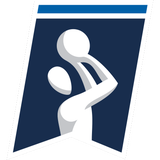
Get more from College Basketball Follow your favorites to get information about games, news and more

